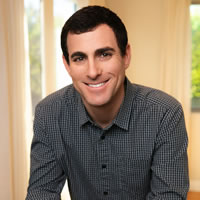Brandon Leibowitz Podcast Transcript
Brandon Leibowitz joins host Brian Thomas on The Digital Executive Podcast.
Welcome to Coruzant Technologies, Home of The Digital Executive podcast.
Brian Thomas: Welcome to The Digital Executive. Today’s guest is Brandon Leibowitz. Brandon Leibowitz is the founder and operator of SEO Optimizers. His digital marketing company is dedicated to assisting small and medium sized businesses in driving more online traffic, leading to increased clients, sales, and valuable leads.
Brandon’s journey in digital marketing began in 2007, right after he graduated from college with a degree in business marketing. His initial job involved managing the marketing aspects of an e commerce website. Back then, Brandon had limited digital marketing knowledge, and so did the company he worked for.
Brandon had no idea what he was doing, and neither did they. He spent a lot of his time reading books, watching videos, talking to other marketers, reading blogs, joining digital marketing forums, etc., to learn as much as possible about this new type of marketing.
Well, good afternoon, Brandon. Welcome to the show!
Brandon Leibowitz: Thank you for having me on today.
Brian Thomas: Absolutely. Love doing this. And I appreciate you making the time hailing out of the LA area there in California. I know sometimes time zones and making a podcast work for people in two separate parts of the world can be challenging, but again, appreciate that. Brandon, let’s jump right into your first question here.
Can you share your journey from managing the marketing aspects of an e commerce website to founding SEO optimizers? What were some of the key challenges you faced along the way?
Brandon Leibowitz: Well, it was a long journey of working full time at different companies. First, well, I got my degree in business marketing and the first job I got out of school is helping an e commerce company out with their digital marketing, which I didn’t really know much about it back then in 2007.
And they said, don’t worry, we don’t know much either. We’re going to learn with you, which I thought was kind of interesting. They said, we’re going to take you to classes and workshops and seminars and Decided to give that a shot and after working there for a few months, just kind of realized that everyone’s probably going to have a website in the future.
And there’s lots of different ways to get traffic and SEO is just a way to get free traffic. And I thought, who doesn’t want free traffic? And over the years, I worked at different advertising agencies and before work and after work about my lunch breaks, I’d work on my own company. Trying to build it up, which presented different challenges of getting clients, trying to figure out how to build a website, market myself, trying to just figure out how to educate people about SEO.
Because back in 2007, people didn’t really know what SEO is still to this day. It’s kind of that mystery box, but back then is even more ambiguous and people didn’t really understand the value of it. So, trying to overcome those hurdles was kind of the biggest, biggest Issue is just trying to educate people about SEO, the benefits of being online and why they should be there versus letting their competitors take their traffic and definitely took a lot of time building up my own business.
So, whereas I’m able to comfortably quit my job, I didn’t just jump ship right away. I built up the company to where they’ll be able to have enough clients where I was stable and knew that if something went bad or if I lost a couple of clients, It wouldn’t be that new world. So, kind of play the safer route.
And that’s led me on this journey to where I’m at now, which is still helping people tap into that free traffic from SEO.
Brian Thomas: Thank you, Brandon. I appreciate that. Love the story. Obviously, we’re put in varying situations, and it’s kind of a sink or swim. And in your case here, you really didn’t know that the SEO part of websites and marketing, and you had to dive in and learn it on your own.
So that’s amazing. Appreciate that. I know our audience will appreciate it as well. Brandon, SEO optimizers focuses on assisting small and medium sized businesses. Can you discuss the specific strategies you use to help these businesses increase their online traffic and sales?
Brandon Leibowitz: Well, it is a little different for each business because with digital, it’s not really a one size fits all every website is different, but some of the commonalities would be keyword research – well, Google can’t read websites. They read the coding. So, putting keywords in the different areas that we Google could better read, understand, and know what your website’s about. So that entails. Finding good keywords that have high search volume and low competition, like, for example, in my clients or a lawyer, personal injury lawyer, and we’re trying to figure out do they want to write for a personal injury lawyer or personal injury attorney.
And when we did the keyword research, personal injury attorney, I believe got 10,000 searches where personal injury lawyer. Got 50,000 searches. So, changing those keywords and making a little variation has a big impact on search volume. And that’s where you have to start off with the keyword research and then incorporate them into the different areas on your website.
And once you’ve done that, Google can then see what keywords you’re targeting. But. They don’t care what you put on the website because they just don’t believe anything that anybody ever puts on a website because too many people have tricked Google over the years that they just don’t believe that you are really who you say you are and you have to build that trust up and trust comes through getting what are called backlinks.
Getting other websites to link out to what is a backlink. A backlink is a clickable link from another website that points to yours. So let’s say you’re reading an article in the LA Times.com and there it says Brandon Leibowitz and you click on it and it goes to my website. Then I’d be getting a backlink from the LA Times.com. So helping people build that trust through backlinks.
Brian Thomas: Thank you so much. I do appreciate that kind of breaking that down for our audience. Not everybody knows really how SEO works and it is an art and a science as you figured out over the years. So, I appreciate you sharing that.
And the next question I have for you, Brandon, is how have SEO strategies evolved since you started in 2007? And what are some of the most significant changes you’ve observed in the industry?
Brandon Leibowitz: It’s constantly changing, but Google is really just trying to clean spam up, stopping people from gaming the system and finding loopholes and ways to rank that are not really legitimate. So, Google focuses a lot on, like I say, like, the keywords and the coding and the content and making sure that you have good original content is a big part, which now with AI, it’s kind of shifted and changed everything same with the backlinks.
Google really has a big emphasis on backlinks and in the past, it was. A numbers game, the more backlinks you had, the higher rank, but people would gain the system and Google said, we don’t want to look at just the number backlinks. We want to look at the quality of these backlinks and what it is a quality backlink to Google.
A quality backlink means it comes from a site that’s related to what you’re doing. So those are really big changes that have happened over the years. Mobile taking over back in like, 2011 or 2012, it became really, really popular. AI and just trying to step to date with all the changes because there is no constant is always changing and always evolving and just trying to step to date with all those changes.
Brian Thomas: Thank you, Brandon. Appreciate that. I feel like I’m getting kind of an SEO one on one class on the podcast here, which is really appreciated by myself. And of course, our audience will enjoy this as well. Brandon, last question of the evening here, looking ahead, what trends or innovations do you foresee shaping the feature of digital marketing and SEO?
How is SEO optimizers preparing to adapt to these changes?
Brandon Leibowitz: The biggest change is probably AI, just trying to figure out what’s going to happen, how AI is going to actually be incorporated into the Google search results and just trying to figure out what the future holds, because now it is very dynamic and we’re just trying to see what’s going to happen is Google going to start using AI in the search results, or is this just temporary and they’re just testing it out?
And are people not going to want to have AI in the search results? We’re just going to have to keep waiting and seeing how Google adapts and adjusts, because they don’t want to lose that market share to ChatGPT or AI. So, they’re going to try to figure out what needs to be done to keep people using Google so they can keep making money and pretty much dominating the internet.
So, we’ll have to see what’s going to happen. But AI definitely is the biggest ship that’s happened over the past couple of years. That is most likely not going to go anywhere anytime soon, because it’s such a big change.
Brian Thomas: You’re absolutely right. I think AI is going to be a game changer for the better, or for the worse. In this case, SEO. So certainly, appreciate that. And we’re going to be keeping tabs on you and what you’re doing and what changes you’re adjusting to adapting to when Google makes those big changes. So, I appreciate that.
Brandon, it was such a pleasure having you on today and I look forward to speaking with you real soon.
Brandon Leibowitz: Thank you for having me on today.
Brian Thomas: Bye for now.
Brandon Leibowitz Podcast Transcript. Listen to the audio on the guest’s podcast page.











